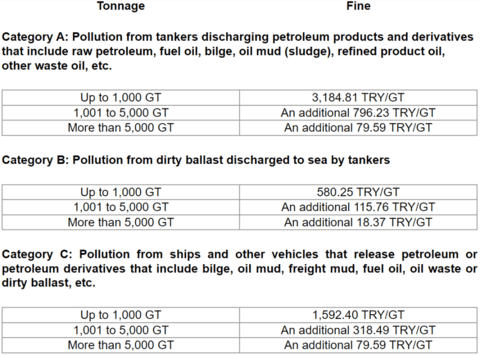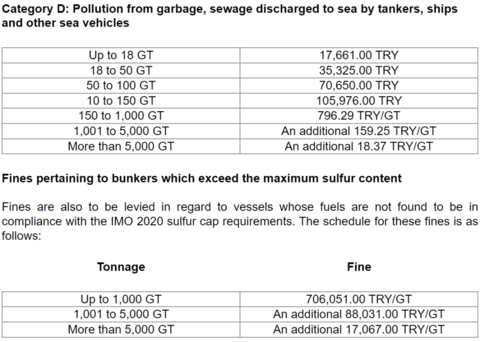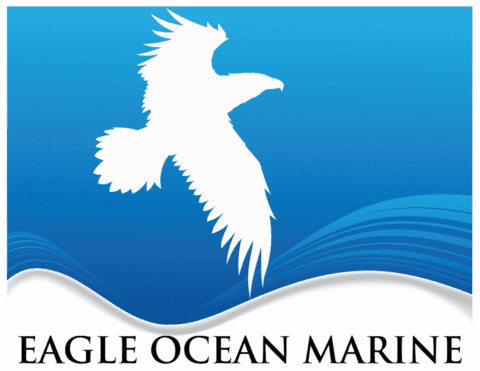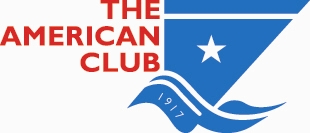
| JANAURY 5, 2024 TO ALL INSUREDS AND BROKERS Dear Colleagues: ENVIRONMENTAL POLLUTION FINES IN TURKEY: AN UPDATE |
| Pursuant to Article 20 of the Turkish Environmental Code, Turkey’s revised Pollution Fine Tariff schedule has come into effect as of January 1, 2024. In the event of sea pollution events, fines may be levied by the Turkish Environmental Protection Agency (EPA) or by local Harbor Masters. For 2024, these fines have increased by 58.5% from 2023. Pollution fines levied by the EPA The 2024 fine schedule has been separated into four categories—A, B, C, and D as summarized below in Turkish Lira (TRY). In addition, fines listed below are tripled for legal entities (e.g., shipowners, ship operators or disponent shipowners) if they are found liable for the pollution. Furthermore, the below rates shall be doubled if the pollution has occurred in designated special environmental protection zones that include the Marmara Region and Straits including all ports and anchorage areas within Istanbul, Kocaeli, Yalova, Bursa, Balikesir, Canakkale, and Tekirdag. |


Important notes
If the shipowner cleans up the pollution caused by an offending vessel, by its own means and through its own efforts, the administrative fine shall be levied at 1/3 of the total amount.
Under the relevant code, the Turkish environmental authorities are entitled to ask for cash settlement of the fine and may not accept security to release an offending ship. On an exceptional basis, the authorities may accept bankers’ drafts and/or payment guarantees issued by the ship’s agents, payable within a maximum of 1 to 2 days and without any conditions.
The authorities may also accept to release a vessel against a Letter of Undertaking (LOU) issued by a P&I club or insurance company recognized by the Turkish Government. However, if such an LOU is accepted, then ir be the basis of an undertaking to pay the fine within a short period of time (no more than 30 days). Further, the authorities may demand for the original LOU to be notarized and with an official translation which would obviously lead to considerable delays to vessels.
It is significant to note that the pollution fine amount may be reduced by 25% if settled within 30 days of issue. Remitting the fine amount will not be considered as an admission of liability and an appeal may still be lodged before the Administrative Court within 30 days of the fine’s notification date. However, appealing the fine will not result in the lifting of the fine and allowing sailing of the vessel and the prospects of success in appeal proceedings are very slim.
Any video footage or pictures taken by environmental officers, coast guard or otherwise can only be released by court order. However, officers do release such records to P&I club representatives or agents unofficially upon occasion.
Thus, Insureds are recommended to consider paying any fines within the appeal period in order to benefit from a 25% discount of the fine to enable to the vessel to sail without delay. If fines are not paid, the vessel can be sold at auction by relevant authorities to recuperate the pollution fines.
Recommendations
- De-ballasting operations should be avoided unless the ballast water has been checked and confirmed to be clean.
- All overboard discharge valves should be closed and secured/sealed in closed position.
- All deck scuppers should be plugged and any gaps in the fish plate surrounding the deck should be closed.
- Washing of decks and superstructure should be avoided, if possible.
- Treated water from the sewage system and grey water should be transferred to a holding tank and should not be discharged until the vessel is outside Turkish waters and in accordance with applicable laws and conventions.
- Cargo residues, cargo space cleaning residues, all garbage and other substances should not be disposed of in Turkish waters.
- The vessel’s hull should not be scraped, chipped or painted while alongside the pier or at anchor.
- While the vessel is at a Turkish shipyard or dry dock, even if the pollution is caused by the negligence of the shipyard, its employees or agents, the ship may be held vicariously liable for the pollution fine. Therefore, the crew members should exercise care and should immediately issue a Letter of Protest to the relevant shipyard.
- Insureds should familiarize themselves and comply with local regulations, which may be stricter than MARPOL regulations. P&I insurance cover for pollution fines responds only to the accidental escape of a pollutant from a vessel, and not in cases where a violation arises due to misinterpretation or operational breaches of local rules.
| If Turkish authorities assert a violation by a vessel which might lead to pollution fine, Insureds are urged to contact Eagle Ocean Marine (EOM) and the local P&I correspondent immediately for assistance. |
| Eagle Ocean Marine (EOM) recommends that Insureds take note of this information and be guided accordingly. |
| Yours faithfully, |
 |
| Dorothea Ioannou, CEO Eagle Ocean Agencies, Inc. |
| Eagle Ocean Marine is an American Club fixed premium facility offering gold standard International Group club service, underpinned by the impeccable security of reinsurance at Lloyd’s. |







